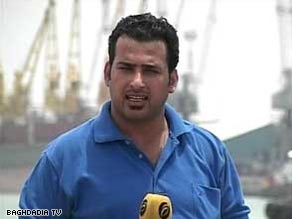
Muntadher al-Zaidi, the Iraqi journalist on trial for throwing his shoes last year at then-President George W. Bush, said the former American leader’s "bloodless and soulless smile" and his joking banter provoked him.
Al-Zaidi threw both of his shoes at Bush during a December news conference with Iraqi Prime Minister Nuri al-Maliki in Baghdad. Neither shoe hit the president, and other people in the room quickly knocked al-Zaidi to the ground before security officials arrested him. He explained his actions in an hour-long appearance on Thursday at the Central Criminal Court of Iraq. Asked if anyone pushed or motivated him to do this, al-Zaidi said he was spurred on by the “violations that are committed against the Iraqi people.” “I could only see Bush and feel the blood of the innocents flow under his feet, as he was smiling that smile — as if he had come to bid farewell to Iraq and with the last support and more than 1 million martyrs,” al-Zaidi said. “At that moment, I felt this is the man who killed our nation … the main murderer and the main person responsible for killing our nation.” Watch more on the trial » Speaking in his first public appearance since his arrest two months ago, al-Zaidi told the court he “got emotional and threw the shoe at him” and “the second one was involuntary.” “I had no intention to kill the commander of the occupying forces … even if I had a weapon … I was expressing my inner feelings and those of all the Iraqi people from east to west and north to south and the feelings of hatred they hold for him,” he said. Al-Zaidi told the judge that he had intended to humiliate Bush in the past. As Bush listed the gains made in Iraq during the mid-December news conference, al-Zaidi said he was thinking about the millions of civilians who had been killed, widowed or displaced. He talked about the sanctity of mosques being violated, the rape of women and daily humiliations. “I don’t know what accomplishments he was talking about. The accomplishments I could see were the more than 1 million martyrs and a sea of blood,” al-Zaidi said. “There are more than 5 million Iraqi orphans because of the occupation. … More than a million widows and more than 3 million displaced because of the occupation.” Al-Zaidi also said he was beaten up in front of the prime minister and the world when he was taken from the room where the press conference was held.
Don’t Miss
Shoe-throwing monument removed from Iraqi orphanage
Bush assailant kick-starts sales for shoemaker
Shoe-thrower asks for leniency
CNN Arabic
The trial will resume March 12 while the court asks the Cabinet to clarify whether Bush’s visit was official or not. Al-Zaidi is charged with “assaulting a foreign head of state on an official visit to Iraq.” In December, al-Zaidi’s defense team filed an appeal requesting the charge be changed from “assaulting” to “insulting.” According to the Iraqi penal code, anyone who assaults a foreign head of state is punished by “imprisonment for a term of years,” with the court deciding the sentence. Lawyer Dhiyaa al-Saadi told CNN in December that his client could face 15 years in jail if convicted. Watch more on the incident » On the other hand, insulting a foreign head of state is punishable by a two-year prison sentence and a fine. Dressed in an olive-green suit and black shoes, al-Zaidi entered the courthouse to loud applause and cheers. Some family members and supporters, who were waiting outside, draped an Iraqi flag around his neck. A woman in the crowd shouted, “You hero!” His 6-year-old nephew, Haidar, stood outside the courtroom reciting the poem “Throw the shoe … at the vampire.” As he left, the crowd pressed forward to get close to al-Zaidi, who waved as he was led away. Earlier, lawyer al-Saadi told the al-Baghdadia television network that his client’s “morale is high.” Al-Baghdadia is the journalist’s employer and has been calling for his release.
By tradition, throwing a shoe is the most insulting act in the Arab world. His angry gesture touched a defiant nerve throughout the Arab and Muslim world. He is regarded by many people as a hero, and demonstrators have taken to the streets in the Arab world demanding that he be set free.
